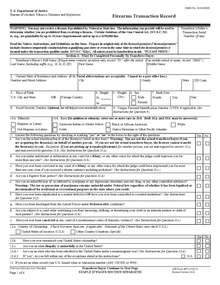Form 4473
A Firearms Transaction Record, or Form 4473, is a form promulgated by the Bureau of Alcohol, Tobacco, Firearms and Explosives (ATF) in the United States Department of Justice that is filled in when a person purchases a firearm from a Federal Firearms License (FFL) holder (such as a gun shop).[1]

The Form 4473 contains name, address, date of birth, government-issued photo ID, National Instant Criminal Background Check System (NICS) background check transaction number, and a short affidavit stating that the purchaser is eligible to purchase firearms under federal law. It contains make, model, or serial number on page three of the six page form. Lying on this form is a felony and can be punished by up to five years in prison[2] in addition to fines, even if the transaction is denied by the NICS. Prosecutions are rare in the absence of another felony committed with the gun purchased. Of 556,496 denied transactions between FY 2008 and FY 2015, federal prosecutors prosecuted an average of under 32 cases per year, including 24 in FY 2013, 15 in FY 2014 and 20 in FY 2015.[3][4]
The dealer also records all information from the Form 4473 into a required "bound-book" called an "Acquisition and Disposition Log.[5] A dealer must keep this on file at least 20 years, and is required to surrender the log to the ATF upon retirement from the firearms business. The ATF is allowed to inspect, as well as request a copy of, the Form 4473 from the dealer during the course of a criminal investigation. In addition, the sale of two or more handguns to a person in a five-day period must be reported to ATF on Form 3310.4.
If a person purchases a firearm from a private individual who is not a licensed dealer, the purchaser is not required in most states to complete a Form 4473. All purchases of small arms (handguns)from private individuals from another state are required to have a Form 4473 completed before sale. Some states (such as California, Colorado, Nevada and New Jersey) require individual sellers to sell through dealers.
These forms are given the same status as a tax return under the Privacy Act of 1974 and cannot be disclosed by the government to private parties or other government officials except in accordance with the Privacy Act. Individual dealers possessing a copy of the form are not subject to the Privacy Act's restrictions on disclosure. Dealers are required to maintain completed forms for 20 years in the case of completed sales, and for 5 years where the sale was disapproved as a result of the NICS check.
eForm 4473
In response to the Government Paperwork Elimination Act (GPEA),[6] and based upon requests from the firearms industry, the ATF has developed the e-Form 4473 to assist in the proper completion of the Federal Firearms Transaction Record (ATF Form 4473). The ATF eForm 4473 is designed to help eliminate errors in completing Form 4473 for both the firearm purchaser and the licensed seller. The eForm 4473 is provided to the public, including major retailers, free of charge via the ATF eForm web site. ATF eForm 4473 is a downloadable application that runs locally on the seller's computer and supports both Windows and Mac OS X operating systems. (See "External links" section below.)
2016 revision
In 2016, ATF made several changes to the form, including adding a warning statement that the use of marijuana is illegal under federal law, regardless of whether it has been legalized or decriminalized for medicinal or recreational purposes in the state where the transferee/buyer resides.[7][8]
Convictions
According to the US Sentencing Commission, approximately 5,000 to 6,000 people a year are convicted of receiving or possessing a firearm against one of the prohibitions above.[9] In 2017, over 25.2 million actual background checks were performed in total.[10]
References
- See generally subsection (g)(1)(A) of 18 U.S.C. § 923 and subsection (a) of 27 C.F.R. sec. 478.124.
- See subsection (a) of 18 U.S.C. § 922 and subsection (a)(1)(A) of 18 U.S.C. § 924.
- https://oig.justice.gov/reports/2016/a1632.pdf
- "As gun ownership increases, prosecutions for lying to get a gun fall".
- See generally subsection (g)(2) of 18 U.S.C. section 923.
- Title XVII (sections 1701 through 1710) of Division C of Public Law No. 105-277, 112 Stat. 2681, at 2681-749 (Oct 21, 1998), amending subsection (a)(1)(B)(vi) of 44 U.S.C. § 3504.
- "ATF Form 4473 - Firearms Transaction Record Revisions - Bureau of Alcohol, Tobacco, Firearms and Explosives". www.atf.gov.
- "Feds spell it out: No gun for you if you fire up in a pot-legal state". 23 November 2016.
- https://www.ussc.gov/research/quick-facts/section-922g-firearms

- https://www.fbi.gov/file-repository/nics_firearm_checks_-_month_year.pdf
